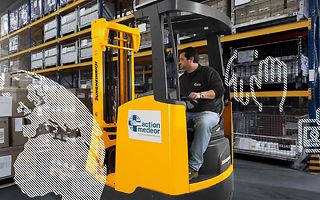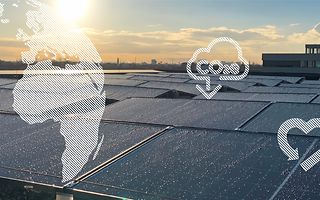- Incoming orders: 2.46 billion euros / +2 per cent
- Revenue: 2.20 billion euros / +11 per cent
- EBIT: 162 million euros / EBIT ROS: 7.4 per cent
- Targeted investments in further expansion of strategic fields of action
- Forecast for the whole of 2022 confirmed
Hamburg, Germany, 12 August 2022 – Jungheinrich AG is looking back on a solid first half of the 2022 financial year. Despite the difficult conditions as a result of the Russia-Ukraine war, the ongoing coronavirus pandemic and the resulting disruptions to supply chains, the intralogistics Group was able to increase its incoming orders and revenue. The value of incoming orders improved by 2 per cent during the reporting period to 2,461 million euros (previous year: 2,419 million euros). Group revenue rose 11 per cent to 2,202 million euros (previous year: 1,988 million euros). Significantly higher material and logistics costs impacted the operating result. However, Jungheinrich managed to achieve an EBIT of 162 million euros, which was just below that of the previous year (169 million euros). As expected, at 7.4 per cent, EBIT return on sales (EBIT ROS) was lower than in the first half of the previous year (8.5 per cent). “Despite challenging conditions, Jungheinrich achieved a robust result in the first half of 2022,” explains Dr Lars Brzoska, Chairman of the Board of Management of Jungheinrich AG. “The Russia-Ukraine war, and the profound global supply chain disruptions involving massive increases in material costs, have caused a high degree of uncertainty in the market. Yet even in this adverse environment, Jungheinrich was able to increase its incoming orders and achieve good revenue growth. New truck business, particularly the very good growth in automated systems, was the main driver of the higher Group revenue. Notable contributions to the revenue increase also came from our short-term rental and used equipment business as well as the after sales business field,” says Dr Brzoska.
To safeguard the ability to deliver, Jungheinrich deliberately pushed the build-up of inventories during the first half of the year. Because of the strong increase in working capital, the new key performance indicator free cash flow – which Jungheinrich is reporting for the first time – fell to -270 million euros (previous year: +84 million euros). As part of its Strategy 2025+, Jungheinrich is driving forward the further development of energy storage systems based on lithium-ion technology in particular. The company has placed its focus on optimising the construction of new trucks, as Jungheinrich has already done with its lithium-ion-integrated trucks in the POWERLiNE series. Additional key development areas for Jungheinrich are digital products, the automation of material handling equipment and the optimisation of automated systems. At the end of May, the company presented innovative mobile robot applications and the PowerCube compact container warehouse at the LogiMAT trade fair in Stuttgart, setting new standards in the field of automated warehousing systems. Jungheinrich significantly increased its Research & Development expenditure in the first half of 2022 by 27 per cent to 61 million euros (previous year: 48 million euros). As part of the targeted expansion of its strategic fields of action, Jungheinrich continued to expand its workforce as planned in the first half of 2022. The number of employees in the Group increased by 297 full-time equivalents, or 1.6 per cent, to 19,400. Despite great economic uncertainty about the effects of the war on supply chains and on energy, raw material and material prices, Jungheinrich confirms its forecast for the 2022 financial year as a whole.
Jungheinrich business performance: January to June 2022
The value of incoming orders, which covers all business fields – new truck business, short-term rental, used equipment and after-sales services – was 2,461 million euros in the reporting period, or 2 per cent higher than the previous year’s figure of 2,419 euros million. In light of Russia starting a war against Ukraine at the end of February 2022, the Board of Management made the decision to stop delivering trucks and spare parts to Russia and Belarus until further notice with effect from 2 March 2022. Incoming orders in the first half of 2022 and orders on hand as of 30 June 2022 are adjusted for orders from Russia in the course of this.
Orders on hand for new truck business came to 1,814 million euros as of the end of the first half of 2022, which is 522 million euros or 40 per cent higher than the previous year figure (€1,292 million). Compared with orders on hand of 1,519 million euros as of year-end 2021, this represents an increase of 295 million euros or 19 per cent. The reason for the ongoing very high number of orders on hand was the continued restricted availability of production materials for further processing.
Group revenue of 2,202 million euros in the first half of 2022 was 11 per cent higher than in the previous-year period (1,988 million euros). Revenue in Germany, the largest single market, rose by 7 per cent in the reporting period to 514 million euros (previous year: 479 million euros). Foreign revenue increased considerably by 12 per cent to 1,688 million euros (previous year: 1,509 million euros). The foreign ratio thus rose slightly to 77 per cent (previous year: 76 per cent). Revenue from outside Europe reached 317 million euros (previous year: 248 million euros). This represents 14 per cent of Group revenue (previous year: 12 per cent).
The main driver behind the higher Group revenue in comparison with the previous year was new truck business in particular, among others with strong growth in the automated systems business. After sales and revenue from short-term rental and used equipment also made notable contributions to the increase in revenue. The supply chain situation resulting from the Russia-Ukraine war and the ongoing coronavirus pandemic remained challenging. Due to the global interconnections in supply chains, the effects of the supply bottlenecks spread throughout the entire supplier and materials portfolio, as well as the associated logistics capacities.
EBIT decreased by 7 million euros, or 4 per cent, to 162 million euros (previous year: 169 million euros). At 7.4 per cent, EBIT ROS was significantly lower than in the first half of the previous year (8.5 per cent). Profit or loss of 103 million euros (previous year: 121 million euros) was thus generated. The earnings per preferred share (based on share of earnings attributable to the shareholders of Jungheinrich AG) accordingly came to 1.02 euros (previous year: 1.19 euros).
Cash flow from operating activities came to −220 million euros for the period of January to June 2022, decreasing by 335 million euros against the previous-year period (115 million euros). The significant decline was due to a clear increase in working capital, especially in the inventories to secure the Group’s ability to deliver and in the finished sales products. This increase had an additional impact on cash flows from operating activities in comparison with the previous year period in the amount of 219 million euros.
Free cash flow, the sum of cash flow from operating activities and investing activities, declined markedly to −270 million euros (previous year: +84 million euros).
Despite the high level of economic uncertainty resulting from the Russia-Ukraine war, with its constantly escalating impact on supply chains and energy, commodity and material prices, as well as the increased risk of potential disruption of gas supplies from Russia, Jungheinrich’s expectations for 2022 as a whole have not changed since the report on the first quarter of 2022 was published in May 2022.
Jungheinrich currently expects incoming orders to be slightly below the level seen in the previous year (2021: 4.9 billion euros). With ongoing bottlenecks in the supply chains, Jungheinrich expects Group revenue for 2022 to be slightly above the previous year’s value (2021: 4.2 billion euros). EBIT and EBT are both likely to be significantly below the previous year’s figures (2021: 360 million euros and 349 million euros). Jungheinrich also expects much lower rates of return for EBIT and EBT compared with the previous year (2021: 8.5 per cent and 8.2 per cent).
In terms of the developments in the cost of materials, Jungheinrich expects the currently high levels to remain in place. As part of the Group’s implementation of Strategy 2025+, Jungheinrich plans to continue with the clear increase in personnel capacities, especially in the strategic fields of automation, digitalisation, energy systems, efficiency, global footprint and sustainability in the remaining months of 2022.
ROCE for the 2022 financial year is expected to come in well below the level of the previous year (2021: 20.2 per cent). As a result of the current business trend, free cash flow is expected to return a significantly negative figure in the reporting year following a positive figure in the previous year (89 million euros).
Also concerning the coronavirus pandemic, considerable uncertainties remain regarding the further course of the pandemic and the resulting impacts on Jungheinrichs business. The forecast therefore assumes that there will be no widespread production standstills and that the supply chains will remain largely intact to the end of the year. Implementing measures to ensure the Group’s ability to deliver will continue to be a priority.
Key figures at a glance
| Q2 2022 | Q2 2021 | Change in % | H1
2022 | H1
2021 | Change
in % |
Incoming orders
(€ million) | 1,128 | 1,097 | 2.8 | 2,461 | 2,419 | 1.7 |
Revenue (€ million) | 1,140 | 1,029 | 10.8 | 2,202 | 1,988 | 10.8 |
EBIT (€ million) | 84.0 | 97.2 | -13.6 | 161.9 | 169.3 | -4.4 |
EBIT ROS (%) | 7.4 | 9.4 | - | 7.4 | 8.5 | - |
EBT (€ million) | 71.2 | 96.5 | -26.2 | 138.1 | 164.7 | -16.2 |
EBT ROS (%) | 6.2 | 9.4 | - | 6.3 | 8.3 | - |
Profit or loss
(€ million) | 53.9 | 70.9 | -24.0 | 103.4 | 121.0 | -14.5 |
Free cash flow (€ million) | n/a | n/a | - | -270 | 84 | <-100 |
Capital expenditure1 (€ million) | n/a | n/a | - | 29 | 25 | 16.0 |
R&D expenditure (€ million) | n/a | n/a | - | 61 | 48 | 27.1 |
Employees
(FTE2, 30/06) | | 19,400 | 18,323 | 5.9 |
- Property, plant and equipment and intangible assets without capitalised development expenditures and right-of-use assets
- FTE = full-time equivalents; part-time employees were taken into account according to their hours




